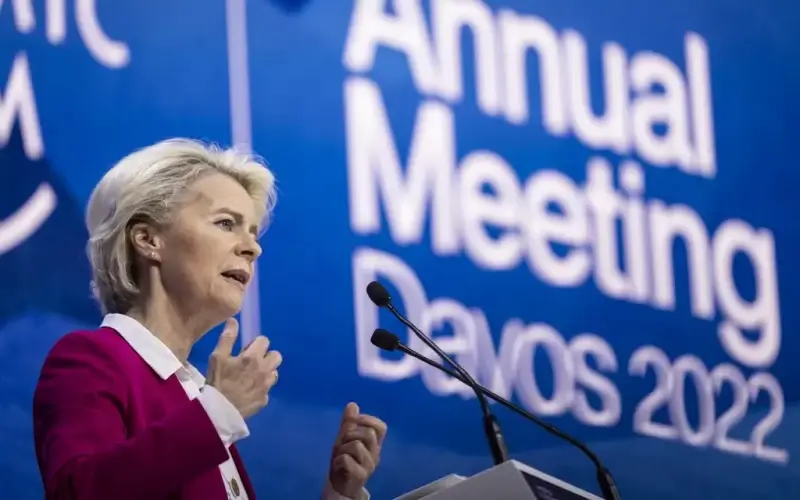European Commission President Ursula von der Leyen has ruled out reaching an EU-wide agreement on banning Russian oil imports at next week’s European Council summit.
In an interview with POLITICO on the sidelines of the World Economic Forum in Davos, von der Leyen said she did not want to raise “false expectations” of a deal being struck next week.
“I think it is not an appropriate topic to be solved on the European Council because it’s very technical what we’re discussing,” she said. "We’re speaking about landlocked countries that need alternative supply via pipeline, so you have to speak about the investment in the pipelines, to increase the supply, and we’re talking about refineries that have to be updated, and investment and renewable energy.”
Her comments come after Hungarian Prime Minister Viktor Orbán said he would not discuss Russian sanctions at the May 30-31 summit.
Imposing sanctions on Russian oil marks a key test of the EU's credibility. It is almost three weeks since von der Leyen proposed a "complete ban" on all imports of Russian crude oil and refined fuels, in an effort to cut off a lucrative stream of revenue that helps Vladimir Putin fund his invasion of Ukraine.
Despite numerous rounds of talks, and the offer of more time to prepare itself for a ban, Hungary has held up a deal on sanctions among the 27 EU countries. Budapest has warned that banning Russian oil would inflict a devastating blow on the Hungarian economy.
Orbán's government has suggested it will cost as much as €15-18 billion to move away from its reliance on Russian oil, including overhauling refinery and pipeline infrastructure. Talks have been ongoing in Brussels about how to respond to Hungary's demands for cash.
“There is a political element that might be discussed — this is, how much are the other 26 [member countries] willing to concede as investment to Hungary, but the first and foremost difficulties are the technical ones we’re discussing right now,” von der Leyen said.
Asked if she expected the issue to be discussed at next week’s summit, she said: “I do not expect it, I do not want to raise false expectations here.”
Von der Leyen also indicated she would speak to Orbán in the coming days.
“I visited him in Budapest to understand what the implications are, and objectively it’s a strong and difficult technical problem. Of course there is always politics in it, but it is primarily a technical problem and of course, we are in constant touch with the two cabinets, because it’s ... very technical what has to go forward."









